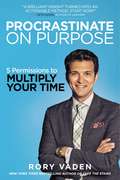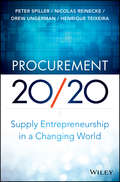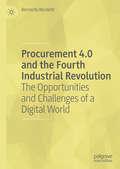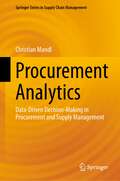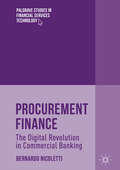- Table View
- List View
Procrastinate on Purpose
by Rory VadenFrom the New York Times bestselling author of Take the Stairs--a bold new way to get things done. New York Times bestselling author and sales-performance trainer Rory Vaden brings his high-energy approach and can-do spirit to the most nagging problem in our professional lives: stalled productivity. Millions are overworked, organizationally challenged, or have a motivation issue that's holding them back. Vaden presents a simple yet powerful paradigm that will set readers free to do their best work--on time and without stress and anxiety.
Procter & Gamble
by Jay W. Lorsch Kathleen DuranteOn July 12, 2012, Bill Ackman's Pershing Square Capital Management announced publicly that it had purchased about $2 billion of Procter and Gamble (P&G) stock. Shares in the company closed up 3.75% the day the disclosure was made public. Ackman told the New York Times that Pershing would be a major P&G shareholder. ""We think it's an underrated stock,"" he said. ""We think there is a lot of great opportunity there."" During the next several months there was little or no public discussion of the matter although people familiar with the situation reported that Ackman held conversations with P&G directors individually. Then, on April 24, 2013, P&G announced that its 3rd quarter earnings had risen 6%. However its 4th quarter forecast fell short of Wall Street's expectations. Shares fell 5% based on this outlook. P&G results were lagging its peers by 4% in 2012 and 2% in the first quarter of 2013. Then, abruptly in late May, CEO Robert A. McDonald, who was 59, resigned. The board selected A.J. Lafley, (65) who had been McDonald's predecessor to return to lead the company. There was speculation about how long Lafley would stay and in what direction he would take the company. On June 6th, P&G announced that Lafley had appointed four senior executives to lead the company's major businesses, reporting directly to him.
Procter & Gamble
by Jay W. Lorsch Kathleen DuranteOn July 12, 2012, Bill Ackman's Pershing Square Capital Management announced publicly that it had purchased about $2 billion of Procter and Gamble (P&G) stock. Shares in the company closed up 3.75% the day the disclosure was made public. Ackman told the New York Times that Pershing would be a major P&G shareholder. ""We think it's an underrated stock,"" he said. ""We think there is a lot of great opportunity there."" During the next several months there was little or no public discussion of the matter although people familiar with the situation reported that Ackman held conversations with P&G directors individually. Then, on April 24, 2013, P&G announced that its 3rd quarter earnings had risen 6%. However its 4th quarter forecast fell short of Wall Street's expectations. Shares fell 5% based on this outlook. P&G results were lagging its peers by 4% in 2012 and 2% in the first quarter of 2013. Then, abruptly in late May, CEO Robert A. McDonald, who was 59, resigned. The board selected A.J. Lafley, (65) who had been McDonald's predecessor to return to lead the company. There was speculation about how long Lafley would stay and in what direction he would take the company. On June 6th, P&G announced that Lafley had appointed four senior executives to lead the company's major businesses, reporting directly to him.
Procter & Gamble (B): Turning to Success
by Rosabeth Moss Kanter Matthew BirdSupplements with the (A) Case.
Procter & Gamble 2000 (A): The SpinBrush and Innovation at P&G
by William A. Sahlman R. Matthew WillisDescribes a set of decisions confronting some managers in the oral care division of Procter & Gamble. They must decide whether to buy a company that has developed an inexpensive, battery-operated toothbrush. The company's product has done well in one market, but determining an appropriate value and structure is challenging.
Procter & Gamble Brazil (A): 2 1/2 Turnarounds
by Rosabeth Moss Kanter Matthew BirdJuliana Azevedo Schahin, a local marketing director for Procter & Gamble in Sao Paulo, had worked closely with Tarek Fahahat, a regional executive based in Caracas, to solve the growth and profitability problems of P&G Brazil. They did so through the creation of lower-cost versions of two premium products which reached BOP (bottom of the pyramid) consumers--an approach not considered then as a company strategy. The case follows Azevedo and Farahat through their steps in helping to conceive the change, sell it to senior management, and implement it. The true test comes when the subsidiary wants to extend the model to its third and largest category, laundry care, which had also struggled. But Azevedo did not oversee that business in Brazil, and Farahat worked in another category in Caracas. Her country colleagues go to her to learn more about the success of the first two products. Now the question is whether this is a one-time wonder or an innovation that should be diffused to other products and geographies.
Procter & Gamble Brazil (A): 2 1/2 Turnarounds
by Rosabeth Moss Kanter Matthew BirdJuliana Azevedo Schahin, a local marketing director for Procter & Gamble in Sao Paulo, had worked closely with Tarek Fahahat, a regional executive based in Caracas, to solve the growth and profitability problems of P&G Brazil. They did so through the creation of lower-cost versions of two premium products which reached BOP (bottom of the pyramid) consumers--an approach not considered then as a company strategy. The case follows Azevedo and Farahat through their steps in helping to conceive the change, sell it to senior management, and implement it. The true test comes when the subsidiary wants to extend the model to its third and largest category, laundry care, which had also struggled. But Azevedo did not oversee that business in Brazil, and Farahat worked in another category in Caracas. Her country colleagues go to her to learn more about the success of the first two products. Now the question is whether this is a one-time wonder or an innovation that should be diffused to other products and geographies.
Procter & Gamble Co. (A)
by John A. Quelch Alice M. CourtAn associate advertising manager at Procter & Gamble is considering several options to strengthen the company's position in the light duty liquid detergent market. One option is to introduce a fourth Procter & Gamble brand in the category. Provides substantial information on the Procter & Gamble brand management organization.
Procter & Gamble Europe: Vizir Launch
by Christopher A. BartlettDescribes P&G's expansion in Europe, including the development of a strong country subsidiary management, responsive to local market differences. The launch of a new product presents strategic and organizational challenges as P&G considers making this their first Eurobrand, and managing it in a coordinated Europewide fashion.
Procter & Gamble Italy: The Pringles Launch (A)
by Roy D. ShapiroProcter & Gamble's (P&G) Pringles potato chips have been a very successful brand. This case reviews the development and first launch in the United States, then in markets around the world. Italy is one of the last countries where Pringles will be launched. Should P&G Italy employ the successful launch strategy used throughout Europe or devise its own?
Procter & Gamble Japan (A)
by Michael Y. Yoshino Paul H. StonehamTen years after entering Japan, P&G had accumulated over $250 million in operating losses on declining annual sales of $120 million by 1983. The decision facing the president of P&G International: exit, retrench or rebuild the operation? Ironically, the initial entry was a success story with P&G Japan achieving an operating breakeven in their fifth year and market leadership in a number of categories. However, in the late 1970's market share and profit in all categories declined disastrously. Management changes failed to reverse the trends until an objective examination of the entry strategy, approach to the Japanese consumer, competition, technology and internal organization were made. By 1983, accelerating losses forced P&G to decide whether to exit or stay.
Procter & Gamble in the 21st Century (A): Becoming Truly Global
by Rosabeth Moss Kanter Matthew BirdSince the 1980's, Procter & Gamble had leveraged its purpose, values, and principles (PVP) to create a global company. When P&G faced difficult times in 2000, the new CEO, A.G. Lafley, leveraged the PVP to drive P&G's turnaround, integrate global operations, and guide decision-making in all facets of the business. But the Gillette acquisition posed a new challenge.
Procter & Gamble in the 21st Century (B): Welcoming Gillette
by Rosabeth Moss Kanter Matthew BirdA.G. Lafley and P&G leaders decided to approach the Gillette integration differently from previous mergers. Using P&G's purpose, values, and principles (PVP) it treated the acquisition as a merger which sought to take the "best of both" from each company. In the integration's first phase, prior to the change of control, the strategy achieved successes while creating some unexpected challenges. How should the integration leaders address these challenges moving forward?
Procter & Gamble, 2015
by John R. Wells Galen DanskinOn July 30, 2015, Procter & Gamble (P&G) announced headline double digit earnings per share growth for the year ended June 30. A closer look at the numbers suggested a less healthy picture. Sales, volumes, and operating profits were down. Investors were not impressed; shareholders were becoming increasingly impatient with the results of Chairman and CEO A.G. Lafley's attempted turnaround. Five-year shareholder returns were well below those of the S&P 500 and the S&P 500 Consumer Staples index. After returning to the company in 2013 in the face of stalling growth, Lafley had announced that P&G would focus on 10 high-growth categories and divest 100 smaller brands in the portfolio. As of September 2015, Lafley had negotiated the sale of 93 brands. Shareholders were left wondering whether this would be enough. Two days before the results were published, P&G announced that 35-year P&G veteran David Taylor would become CEO on November 1, 2015. Lafley would remain Chairman. At the time, Taylor respectfully declined to be interviewed by the press. He had a lot to think about.
Procter & Gamble: Always Russia
by David J. ArnoldP&G has rapidly gained market leadership in Russia with the Always feminine protection brand. The distinctive emerging market strategies employed by P&G are discussed. In planning further market development, the management team faces three decisions: 1) whether to maintain the price premium of Always or to attempt to develop the mid-market through lower priced brands; 2) whether the different marketing strategies employed in different countries in Central and Eastern Europe should be harmonized, especially in light of current parallel importing problems; and 3) whether the feminine protection portfolio should be extended by launching either Alldays pantiliners and/or Tampax Tampons.
Procter & Gamble: Global Business Services
by Thomas J. Delong David L. Ager Alex Cabanas Phil Shellhammer Warren BrackinDave Walker, vice-president of business service opportunities and chairman of the governance team at Procter & Gamble, must decide what to do with P&G's 5,700 employee Global Business Services (GBS) group. GBS brought together internal services such as finance, accounting, employee services, customer logistics, purchasing, and information technology into a single, global organization supporting all P&G business units. Recently, P&G CEO A.G. Lafley questioned whether continued investment in GBS represented the best use of P&G's resources. Walker and the other members of the governance team must decide whether to spin off GBS, outsource GBS services to an outside company, outsource the GBS divisions separately to best-of-breed companies, or keep the group in-house. In making the decision, Walker and the members of the team must consider the impact on the organization of altering the existing relationships between the members of GBS and the other employees at P&G. Teaching Purpose: To consider the issues inherent in any decision to outsource services and the impact of such a change on the company.
Procter & Gamble: Improving Consumer Value Through Process Redesign
by James L. Mckenney Theodore H. ClarkThe evolution of Procter & Gamble's development of efficient consumer response (ECR) involved a series of trials, a resolve to distribute diapers on the basis of product movement, a conscious effort to move to a new means of distribution across all lines, a first cut at a new system, and finally, the development of the existing mix of integrated IT systems linking the value chain from factory to shelf.
Procter & Gamble: Marketing Capabilities
by Rebecca Henderson Ryan JohnsonP&G had become known and recognized as a marketing machine. It was the largest advertiser in the world, with 2010 spending of $8.68 billion. From the company's early exploitation of broadcast media (radio and television) for its soap products to more recent experiments in digital media for its men's hygiene brand Old Spice, P&G was a seasoned marketer with strong consumer research, a powerful innovation network, and the world's largest financial commitment to advertising.
Procter & Gamble: Organization 2005 (A)
by Mikolaj Jan Piskorski Alessandro L. SpadiniIn response to a huge crisis in 2000, the new CEO of Procter & Gamble has to decide whether to continue with an unusual organizational design or to revert to the old matrix organization. Describes all the organizational designs used by Procter & Gamble from the 1920s onward, including geographic, product, and matrix architectures. Market development organizations, global business units, and global business services unit, each of which is heavily interdependent with the others and none of which has a clear decision-making advantage, comprise the unusual organizational design. Examination of the different organizational designs, trade-offs associated with each organizational architecture as well as the accompanying implementation problems.
Procter & Gamble: Organization 2005 (B)
by Mikolaj Jan Piskorski Alessandro L. SpadiniAn abstract is not available for this product.
Procter & Gamble: Organization 2005 (B)
by Mikolaj Jan Piskorski Alessandro L. SpadiniAn abstract is not available for this product.
Procurement 20/20: Supply Entrepreneurship in a Changing World
by Nicolas Reinecke Henrique Teixeira Drew Ungerman Peter SpillerHow to achieve procurement excellence today and evolve to be ready for tomorrow Procurement entrepreneurship pays. High-performing procurement teams can deliver huge value to their companies—regardless of industry. The best companies are advancing talent-management strategies into the heart of their procurement organizations with huge success. In addition to an estimated $84 billion in yearly cost savings, companies who give procurement leaders prominence deliver superior returns from their operations as well as lower their costs of goods sold. This book, written by a group of purchasing and supply management practice experts, shares the hard-earned insights of more than ten years of dedicated procurement research conducted with leading academic institutions and practical experience with marquee clients in the field of procurement. It is also a natural successor to the many articles McKinsey & Company has published on the topic. This reliable resource skillfully explains and codifies the best practices that leading companies have pioneered in procurement as well as frames how procurement must evolve to grapple with new global, social, and economic issues affecting business over the next decade. Details the four key dimensions of procurement excellence Showcases the five megatrends that will change the way business is done in the next decade Provides strategies that business leaders can adopt in the face of these megatrends, together with practical advice about next steps and case examples The road ahead will require you to redefine your vision for procurement and implement the required changes. Procurement 20/20 will show you how.
Procurement 4.0 and the Fourth Industrial Revolution: The Opportunities and Challenges of a Digital World
by Bernardo NicolettiWe are living in the middle of a Fourth Industrial Revolution, with new technology leading to dramatic shifts in everything from manufacturing to supply chain logistics. In a lively, developing field of academic, procurement is often neglected. Despite this, procurement plays a vital role, connecting the organization with its ecosystem. At a time of change and economic crisis, a new business model is called for, which this book aims to define. Based on the applications of Industry 4.0 concepts to procurement, this book describes Procurement 4.0 as a method and a set of tools, helping businesses to improve the value of their products, reduce waste, become more flexible, and address the business needs of the future. It will appeal to academics in the area, as well as practitioners.
Procurement Analytics: Data-Driven Decision-Making in Procurement and Supply Management (Springer Series in Supply Chain Management #22)
by Christian MandlThis unique textbook explicitly addresses the intersection of advanced analytics and procurement. It is motivated by one core question: How can firms generate (economic) value from procurement data? It demonstrates that procurement is one of the major functions within a firm where data analytics, artificial intelligence, and operations research can successfully be leveraged to reduce cost and risk and to achieve resilience and sustainability goals.The book provides a methods-based overview of data-driven optimization of purchasing decisions. Besides presenting key concepts and applications, it particularly focuses on implementation, so as to help (future) procurement managers and data scientists quickly evaluate the value generated by a given data-driven solution. What sets this textbook apart is its combination of rigorous, state-of-the-art methodologies from academic research and first-hand experience from various application-oriented consulting projects in a range of industries. Though primarily intended for graduate students with a major in procurement and supply chain management, the book will also benefit purchasing managers with and without specific knowledge of advanced analytics techniques, and data scientists with and without specific experience in procurement.
Procurement Finance: The Digital Revolution in Commercial Banking (Palgrave Studies in Financial Services Technology)
by Bernardo NicolettiThis book presents a business model on how to structure the relationship between financial services and procurement. The need for new models is particularly important to support small and medium enterprises (SMEs) where there is an evident difficulty in accessing credit. Due to this context, innovative solutions must be introduced.The objective of this book is to determine how innovation can support the dynamic and volatile international context and the increasingly relevant function of procurement. It is becoming more and more important to take into account complex international transactions with notably long payment terms. Organizations need to manage the best way to handle the financial relationships and the risks related to credit provision and payments. This book presents an end-to-end support to procurement, including trade finance, supply chain finance, and related payments.In addition, the enterprises need to keep sufficient liquidity levels in the short and medium term. This is a constant challenge today, with the turbulence of financial markets and a continuing climate of economic uncertainty making it harder to obtain external funding. Businesses need to optimize the working capital. This can be done through the innovative concept of procurement finance, which allows SMEs to benefit by the new vision of collaborative procurement. This book provides several practical examples of advanced procurement finance solutions. It demonstrates how the use of process improvement and technology can help in overcoming the current financially difficult situation. In addition, based on the business model presented, the integrated approach to procurement finance allows sustainable solutions which will be of interest to academics, researchers, managers, and practitioners in both buyer and vendor companies, as well as in banks and other financial institutions.
